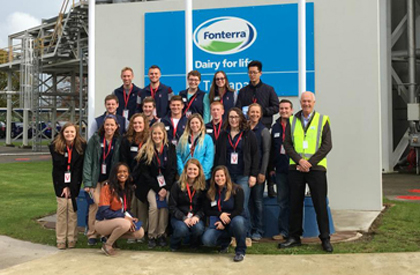By Anca Voinea
Co-ops in New Zealand have been showing how they run successful businesses while promoting sustainability to mark the International Day of Co-operatives.
The theme of the day, held on 7 July, was sustainable societies through co-operation, in line with the UN’s sustainable development agenda.
Craig Presland, chief executive of Co-operative Business New Zealand, said: “The United Nations has recognised New Zealand as one of the most co-operative economies in the world. Our co-ops and mutuals generate almost one fifth of this country’s GDP, employ over 50,000 people and serve almost one-in-three Kiwis as members.
“Cooperative Business New Zealand supports and promotes the UN’s 17 Sustainable Development Goals, as we recognise that the co-operative business model is the most closely aligned towards supporting the UN in meeting these goals by 2030.”
According to Mr Presland, many of New Zealand’s co-operatives, particularly those from the agri-producer sector, are now investing heavily in achieving true environmental sustainability.
Last year, dairy giant Fonterra committed to restoring 50 key freshwater catchments. Its farmers have spent over NZ$1bn on environmental initiatives between 2012 and 2017, and fenced off more than 98% of significant waterways on farms.
Mr Presland added: “Ballance Agri-Nutrients and Ravensdown utilise satellite-controlled technologies to ensure the right amount of fertiliser is applied on the right pastures and at the right time. Agri-producer co-operatives work to maintain the longevity of the land where they grow crops through sustainable farming practices including responsible irrigation.
“Other initiatives from our agri-producer co-operatives include lowering greenhouse gas emissions through innovation and infrastructure, co-generation of energy including less use of fossil fuels, and the more efficient use of energy. Co-ops are also minimising waste from farm to consumer including the recycling of packaging and the introduction of farm environment plans that focus on reducing the impact of farming and manufacturing on the environment.”
Co-ops across other sectors were also making a difference, he added.
“Consumer co-operatives support sustainable sourcing for their products and educate consumers about responsible consumption. Co-operative banks and credit unions contribute to stability thanks to their proximity to their customers and the provision of access to finance at a local level while being widespread in their locations,” he said.
“In addition, profits are distributed back to customers and therefore retained locally each year as opposed to the $5bn plus per annum in profits currently being generated by New Zealand’s four largest retail banks, each of which is owned by an Australian parent company.
“Utility co-operatives are engaged in the transition to cleaner electricity, such as the newly formed Energy Democracy Co-op, NZ’s first solar power generation co-op established in the Wairarapa region back in May. New Zealand’s co-operatives across all sectors aim to provide goods and services in an efficient, planet-friendly way, while creating sustainable jobs, decent work conditions and addressing gender equalities.
“In the drive for true sustainability, New Zealand’s co-operatives have the opportunity to collaborate more effectively – sharing information and resources, avoiding duplication of services and leveraging from combined purchasing requirements. Through collaboration and co-operatives, New Zealand can truly become the world’s most sustainable nation.”
